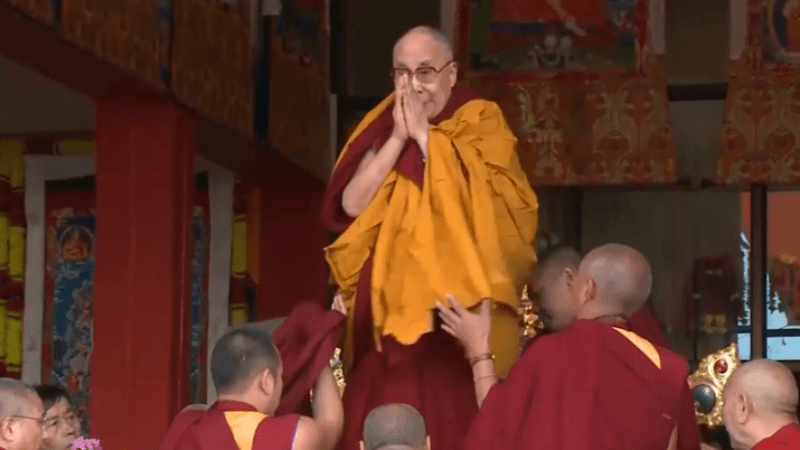
In the wake of the coronavirus outbreak, the Central Tibetan Administration (CTA), also known as Tibetan government-in-exile, on Monday announced to dedicate this year as 'Year of Gratitude' to mark the 85th their birthday of their spiritual leader the Dalai Lama, revered as a 'living god'.
Virtual teachings, it said, offer solace, hope, and blessing for thousands around the globe. "We urge Tibetans and our friends around the globe to initiate and take part in activities in their capacities to create awareness about the life and four commitments of His Holiness," the CTA led by Lobsang Sangay said in a statement.
"The world today is going through a traumatic experience, around the globe, more than half a million people have lost their lives due to the pandemic. Taking this opportunity, we offer our prayers and solidarity to all the nations and individuals affected by COVID-19," it said.
"As the number of cases surge in India, we urge the public to take the necessary precautions to keep one another safe. In these uncertain times, His Holiness' virtual teachings offer solace, hope, and blessing for thousands around the globe.
"His teachings call for oneness of humanity, and for kindness and compassion to be the guiding values of everyday life," said the CTA, headquartered in this northern Indian hill station, said in a statement. Taking this opportunity, it said, "We thank each and every individual, organisation, and government who has supported the initiatives of His Holiness and joined us in the just cause of Tibet."
"Tibetans acknowledge with deep gratitude the debt we owe to His Holiness, the greatest of all the Dalai Lamas. We proudly celebrate his life and legacies. We pray for the day when Tibetans in Tibet will get to seek His Holiness' blessing and teaching from his seat in the Potala Palace in the Land of Snow.
"May His Holiness' light continue to shine upon us"
Tens of thousands of Tibetans settled across the globe virtually celebrated the 85th birthday of the Dalai Lama. In March 1959, His Holiness had to leave his homeland as a final resort to seek freedom for his people.
From the first day, he stepped into a life in exile, His Holiness has worked to protect his people, lead a political movement, and preserve the unique cultural identity of Tibet, said the CTA.
"When Tibetans look at our recent past, we remember our great loss but this loss has been bearable, indeed it contains possibility for a future because of His Holiness. His Holiness has softened the blunt break in our lives and has helped reshape our suffering into something that can contain hope.
"Tibetans exist as proud Tibetans even under conditions of continued dispossession because of His Holiness.
"Today, many around the world view Tibetans as the most successful refugee community with schools, refugee settlements, monasteries and a democratic polity capable of representing and uniting all Tibetans. Like a parent with unconditional compassion, His Holiness had made supreme sacrifices to nurture us.

"His untiring effort and farsightedness has saved Tibet from becoming a mere footnote in the story of lost and forgotten nations," added the CTA.
Replying to Mind & Life Institute President Susan Bauer-Wu in a virtual conversation last month, the Dalai Lama said, "You'll have to judge from my face. I'm 85 and physically very healthy. I feel this is because my mind is peaceful as a result of my cultivating altruism, the awakening mind of 'bodhichitta'.
"This illness is serious," His Holiness responded to a question on the global pandemic. "Many experts are paying attention to it, so I have nothing to add. I appreciate their efforts and the help they are giving so many people -- both those who are doing research and those who are giving treatment and care. So many doctors and nurses are putting themselves at risk.
"I believe that when there is fear it makes the effect of the illness worse. We need a stable mind. An eighth century Nalanda Master, Shantideva advised that we examine the situation we find ourselves in. If a problem has a solution, we must work to find it; if it does not, we need not waste time thinking about it. This is a practical approach. It's helpful to reduce our fear and anxiety. In the context of evolving worlds and galaxies, one human life is tiny, but when it ends, the end is not permanent. Something goes on, life after life.a
In 1959, the occupying Chinese troops suppressed the Tibetan national uprising in Lhasa and forced the Dalai Lama and over 80,000 Tibetans into exile in India and neighbouring countries. On reaching India after a three-week-long treacherous journey, the Dalai Lama first took up residence for about a year in Mussoorie in Uttarakhand.
On March 10, 1960 just before moving to Dharamsala, which also serves as the headquarters of the exiled Tibetan establishment, the Dalai Lama had said: "For those of us in exile, I said that our priority must be resettlement and the continuity of our cultural traditions. We, Tibetans, would eventually prevail in regaining freedom for Tibet."
Currently, India is home to around 100,000 Tibetans and the government-in-exile, which has never won recognition from any country.








